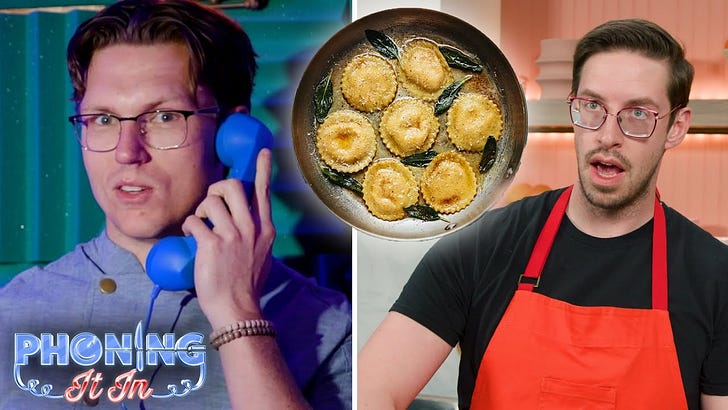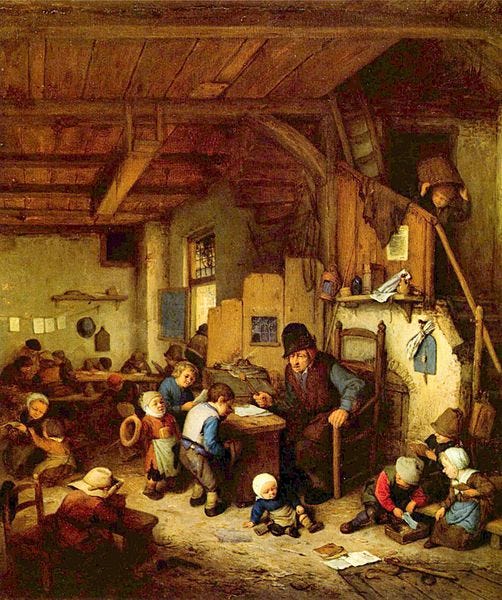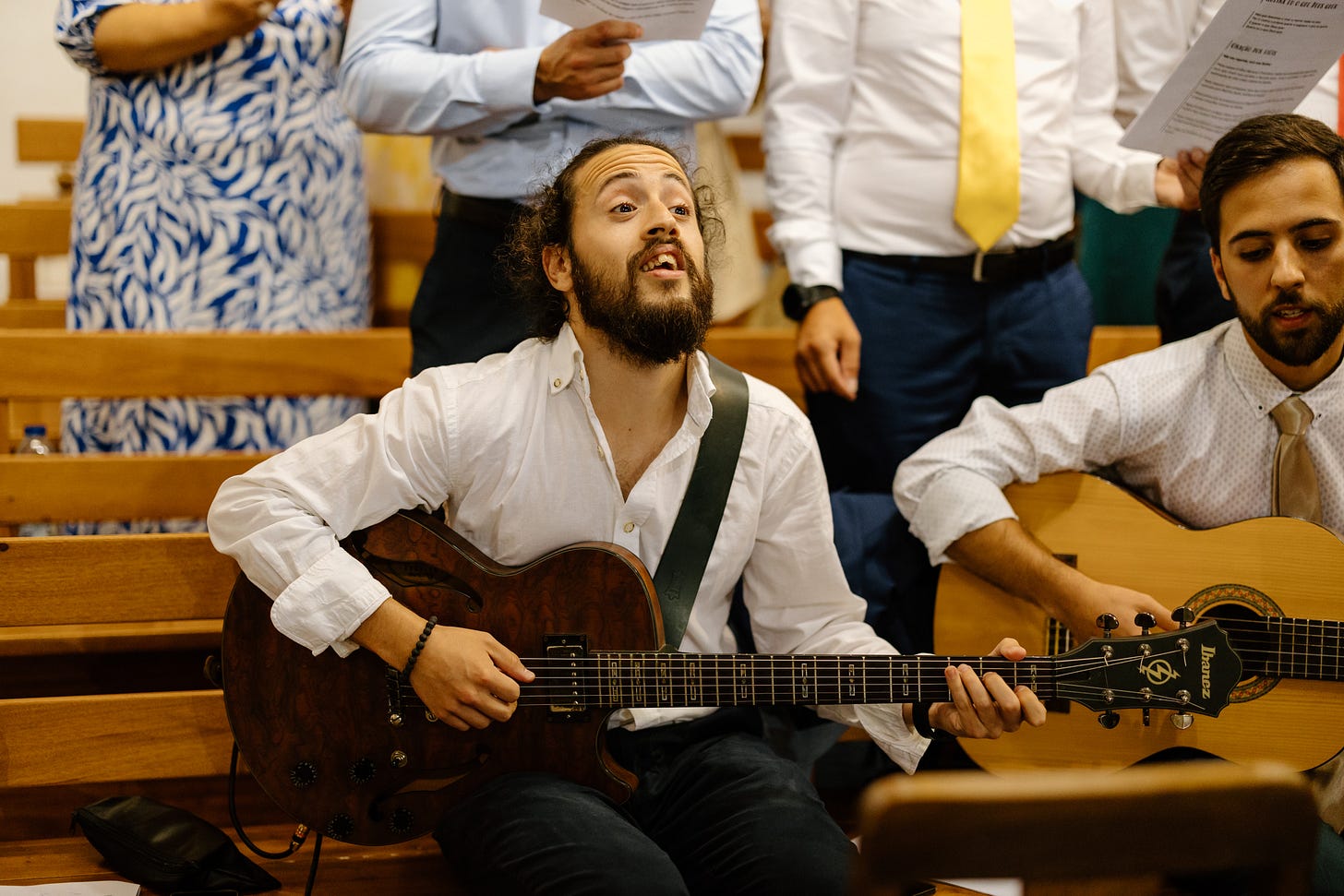The Try Guys and the Art of Teaching
What a YouTube show reveals about mentorship, mastery and the power of teaching.
A couple of weeks ago, my girlfriend introduced me to The Try Guys.
If this surprises you—yes, I’ve been living under a rock.
For those who share this rock with me, The Try Guys are YouTubers who started at BuzzFeed before branching out to build their own media brand, amassing millions of subscribers and even launching a streaming service—all by trying bizarre and unconventional things.
Among their many video series, the one we watched the most was Phoning It In.
Here’s the concept: in each episode 2 teams compete to make the best recipe based on a random theme. Each team is composed of an expert and an idiot (their words, not mine). The expert picks a recipe for the other person to cook and has to instruct them to cook it as effectively as possible through the phone, without ever naming the dish. The only moment that the Chefs get to see the dish is once is revealed to the Juris.
Each team starts with 30 minutes on the phone. Once those are done, Chefs will play a mini-game while “puppets” continue working the best they can. After the mini-game chefs can call them again and help out for a period of time, before leaving them completely on their own for the last 10 to 30 minutes, before showcasing it to the juris.
It’s a light and entertaining series, but it didn’t take long for me to notice certain hidden truths about education in almost all episodes, which I’m distilling here.
Let’s start with the Chefs (aka, the teachers or experts).
When it comes to people willing to participate in this, you have a wide spectrum that ranges from Tik-Tok baking starts to Michelin Start Pastry Chefs. This generates a rich landscape of knowledge and approaches to the challenge.
The biggest hurdle in this contest is getting as close as possible to the vision and worldview of an amateur, to help them with the task, while being a professional. This is something common in education, posing a great challenge to many educators.
My theory is that people who are very good at what they do are more capable of understanding the amateur mind than someone who’s very very good, a genius.
There is a big difference between the conscious competent individual and the unconscious competent. True genius lies in the latter, the best teachers in the former. A very rare subset of people can navigate both of them.
In the series, you see this clearly through the communication between the chef and the student. Geniuses make a series of assumptions that great teachers simply don’t, finding a way to meet the students where they are, while never forgetting about where they want to go.
Genius: “Now you need to grab a sauce pan”
Great Teacher: “I want you to grab a small, tall pan”
Both of them are asking for the same thing, one of them assumes the student understands the gestalt (the sum of all parts), and the other one describes the object in a way that highlights what’s probably more familiar to the student (size and height).
Here’s another example:
Genius: “We need to make a ganache”
Great Teacher: “We need to make a smooth mixture with chocolate and cream”
Maybe the student knows what a ganache is. Even in that case, with a great teacher, they get to shine by asking “Are we making a ganache?” increasing their emotional involvement with the process.
All of these are attempts to engage with the student’s worldview, to inhabit that view, and to help them outgrow it. This is more evident when you see them use whatever the students say as a reference, building high rapport.
If the filling of an eclair is described as a “white gooey mixture”, that’s what they’re calling it for the rest of the recipe. A small spatula is a “pickle scraper”? Sure thing, that’s what they’ll call it from now on.
Throughout the series, you see chefs either choosing to engage or rejecting the worldview of a student. You can either have an adjustment to the student who’s actually cooking, facilitating communication, and reducing wasted time, or pull them into a more advanced perspective, that lacking immediate and complete feedback, may not work at all.
This gets me to the second point: feedback.
Since most of this is done over the phone, the only moment that chefs get to see the final product is when it is presented to the judges. The mismatch between the expectations of Chefs and the actual creation is a fundamental part of why the videos are funny. From a content-production standpoint, it’s golden. From a learning standpoint, it showcases one of the biggest mistakes one can make, which, unfortunately, is pretty common in educational contexts: the lack of short-term feedback on a project.
More often than not, in learning experiences, opportunities to improve and grow are only given too late in the process, making it almost impossible to implement changes. Embracing the kind of obsession that entrepreneurs have with feedback from customers can be something educators and students learn from, quickly understanding how their message lands and what needs to change in order to make it better and more effective.
If we look at the judging moments, however, things get slightly inverted. Those who are more qualified tend to give better feedback, more kindly and effectively. A YouTube chef will have a much higher chance of “trashing” a dish than a professional one. Self-confidence aside, this might allow us to better understand how to make the most out of two different types of mentors.
Geniuses might not be good at teaching you how to master a certain skill, but their feedback might be more useful than the one given by a great teacher since it might bring details that only someone who’s an absolute master in that skill can notice.
Now, in the show, just because you had a better learning experience, it doesn’t mean you won. A lot of the time, the recipes from other chefs are just better, even when poorly executed.
But life is not a YouTube contest and it’s not hard to argue that a better learning experience can improve any aspect of your reality. I’d bet that contestants who had the best teachers are more likely to recreate the recipe on their own than those who won but had a poor learning experience.
You should be pursuing as many meaningful and effective learning experiences as possible.
Now, what’s the point that I’m trying to make? For educators, a reminder of how important communication is. For students, maybe an extra reflection.
One of the most common pieces of career advice is to find a mentor. I agree, but want to highlight how important the choice of that mentor is. For most people, I would recommend finding someone who’s a great teacher, even if they’re not “Michelin Start” good.
You want to be able to master the basics of your craft and you’ll have a much better learning experience by having a great teacher instead of a genius. However, once you develop a strong enough basis, you should seek feedback from those who are in the 1%. For most people, this is the way they should combine these 2 types of mentors.
I can already hear the voices of those who’ll say that you should go straight to the best person. I agree, as long as you understand that that might not be the case for everyone. It can either push them to an extremely high level or overwhelm the student. At the end of the day, it depends on the student’s self-awareness and desire.
Let me give you an overview of my own experience studying under the wing of a genius.
When I left high school, I wanted to pursue music with a particular teacher. He was a genius on the guitar (still is), one of the best in Europe, mixing both jazz and rock, with a very particular improvisational language and a superb technique.
I was accepted into the college where he taught classes and was quickly informed that there was an “unofficial policy” in the school. There were 2 guitar players teaching students: one of them was the genius I was talking about, and the other one, was a great teacher. Guitar students usually would have the first 2 years with M (the great teacher) and the last one with A (the genius).1
Until recently, I was the only student in that University to have “A” during the full duration of my course. For 3 school years, every single week, I got to be seated across a personal hero.
Was it a blessing? Sure.
Was it wonderful? No. Not at all.
Besides the constant fear of disappointing him (and myself), I lived in a perpetual state of self-doubt and panic, being eaten alive by anxiety every single week before class, desperate for his approval.
I studied around 7 hours every single day while still trying to live a normal “college life”. When my wrist started to hurt badly, I ignored it, sucking up the pain and not telling anyone. At 19, I developed a case of carpal syndrome that, according to the physician, she only saw in patients that were 60+ years old. I spent those weeks studying harmony, visualizing patterns, chords, and scales, and trying to keep my momentum, even if I couldn’t physically hold the guitar.
The main driver for this obsession was fear, not joy.
Did it make me a better guitar player? Yes. Did I want to quit? Often.
Is he a phenomenal guitar player? Absolutely. Is he a great teacher? Not really.
As a student, I was always in this position of trying to complete a puzzle without any reference. I wanted to understand his worldview, but I just couldn’t. Everything was natural to him, justifiable by this unconscious logic, rooted in his work and talent. Sometimes I would have glimpses of that understanding, and my playing would improve drastically, very quickly. But most of the time, I was grinding my teeth, searching for clues, molding myself to the experience, and trying to figure out what to do.
I wasn’t taking great classes—I was simply surviving in a high-level environment where just being there pushed me to play better.
The thing is, when you talk with geniuses in a teaching position and raise this concern, a lot of them will tell you that they never meant to put that kind of pressure. But there’s a big difference between words and actions.
Running the risk of justifying a mild form of abuse, though, I think that that kind of pressure might be important if you’re a mentee of someone like this.
Whiplash glorifies this idea.
The mentor pushes the student to a point of no return and they rise to the occasion! Regardless of them becoming the best living musician of that generation, such an approach allows, indeed, for great achievements in a short period of time.
This last part is extremely important. You’re “speed running” mastery, of course you’re going to need gigantic amounts of pressure to do so.
I was recently listening to The David Rubenstein show, where he interviewed Mary Erdoes, the CEO of the asset and wealth management division of JP Morgan. When talking about their analysts, Mary brings up the theory of the “ten thousand hours”, popularized by Malcolm Gladwell. It claims that someone needs to work on a certain subject for 10000 hours to master it.
If you think 10000 hours is about what you need to master any subject… if someone comes in and has a regular eight hour a day job, five days a week, [it will] take about five years to have a base level mastery. On Wall Street it's more like 12 hours a day, six days a week. That cuts you down to about two and a half years before you become mastered in something.
Once again, speed is the element that really makes the difference here. You can still “get your reps” in a more timed, healthier way. To achieve greatness, this speed helps you master the basics more quickly, allowing you to inject your own individuality into the craft sooner.
Looking back to my relationship with A, I can pinpoint a moment where I outgrew my fear. During the last year, once I had already realized I wasn’t going to be able to pursue music at the level I wanted, I gathered all my courage and had a long conversation about everything I had felt during that period. All of the pressure, the self-doubt, the pain, the fear…That conversation is probably the highest point in my personal growth during college.
During those 3 years, I learned a lot about being a better musician and a better human being. I learned how important listening is, in music and life and how improvisation is part of everything that we do. There are many skills I’ve developed back then that I still apply, every day, as an entrepreneur and educator. And yet, the biggest moment for me was having the courage to sit down and tell him: “A, there’s something I need to tell you”
All of this is to say that learning experiences are always transformative experiences.
If you want to learn with a “master”, that transformation will never be something purely good or bad. It will be an intense, emotional journey that you need to be willing to make.
For some people, that’s exactly what they want. For others, having a great learning experience, while enjoying a slower, but steady growth is the way to go.
The question is: which one of them applies to you?
Now, if you excuse me, “A” just released a new album and I can’t wait to bask in its glory.
I’m choosing to not share their real names out of respect for their careers. I would hate to have my personal experience taint the view of any of these phenomenal musicians.






